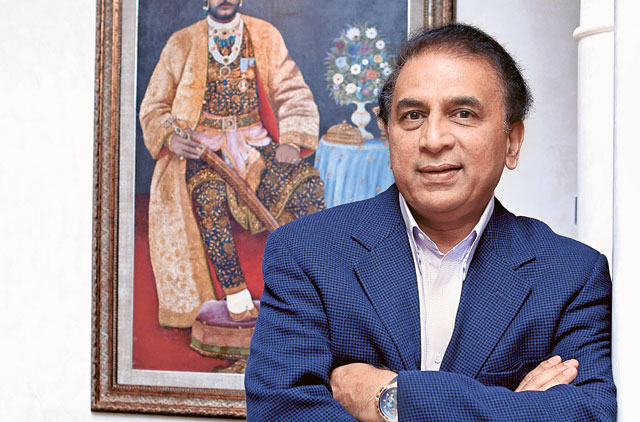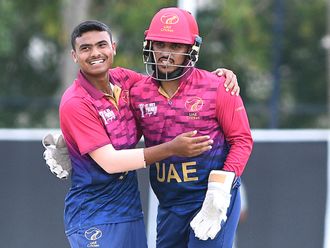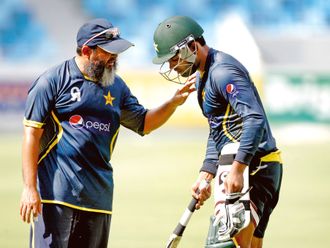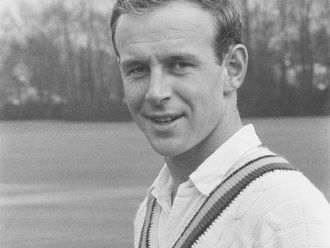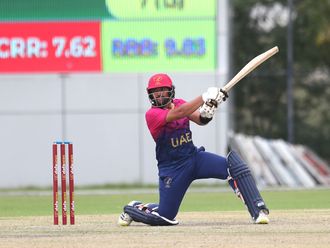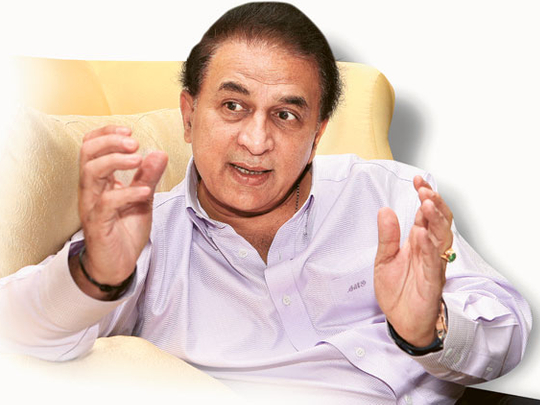
Dubai: The most complete opening batsman of his generation, Sunil Manohar Gavaskar was the first player to give Indian cricket an identity upon which future cricketers based their game, their personalities and their equity.
Having retired after scoring the highest number of Test centuries and the highest number of Test runs, Gavaskar is today the voice and conscience of cricket.
A television commentator and columnist, his views on the game are treated with reverence. All of 63 years young, Gavaskar commands a respect that few have earned not just by playing, but by being the ultimate role model for Indian cricketers.
By his own admission, he may have given his last big interview 22 years ago.
Speaking exclusively to Gulf News, he looks back, and ahead, on a range of questions and deals with them in his characteristically measured, professional and honest way.
Gulf News The most important moment in the life of a successful sportsman/woman is to time their retirement right. If they miss that moment then slowly, but surely, they are seen as liabilities. Would you agree?
Sunil Gavaskar There are two aspects to a sportsperson wanting to play, or to quit the game. Both aspects are related to what makes him successful: the mind and the body. The body is trained to do what it has to do, from whatever age you start. The body because of wear and tear gets a bit on the slower side, but the mind can stay sharp. In fact, the mind, with experience, gets even more honed. It begins to get the little nuances right — like how the body is doing. So the mind gets sharper as the body gets older. And it's either one, or both that tells you, ‘Boss, this is it…it's time to go.'
This is where the dilemma comes in for a sportsperson — when both the senses are not sending the same feedback. So he asks, ‘who do I listen to? My mind, or my body?'
If both are sending the message then it's an easier decision. When the mind and body say ‘hang on a minute, enough'.
I think the issues arise when you listen to one and not to the other. More importantly, however, when the mind tells you ‘enough' is when a sportsperson really should be looking to go, because the body is telling you to carry on, albeit on a slower scale.
In my case it was the mind that told me. It told me a year before and I dragged on for 8-9 months. Like, if I was in a Test match, I would look at the clock and say, ‘Oh my God! Another 20 minutes to tea time. Or, another 10 minutes to go before end of the day's play. In limited overs cricket it would say ‘five overs of fielding left'.
So that to me was the surest sign that I wasn't enjoying it. Because when you are enjoying it you are fully focused and don't even look at the time, or the number of overs. They don't come into the picture. The World Cup was a target for me and I said, ‘Look, this is it. If you have to go then play the World Cup in India and if we retain the title then nothing like it'. It was an easy call for me.
Put yourself in the position of the current veterans who are playing in the India team. There's a lot of debate surrounding their retirement and lack of form. How do you think they are assessing their situation?
Firstly, I would not assume. The sensibilities about cricket have changed from my time. So I wouldn't presume to take a call on their behalf for that reason. The attitude and the approach towards the game have changed. There are new formats, so the thinking has also evolved. Therefore, in a situation like that, the mind works differently. I don't know what is in their mind. There is a lot of money that has also come into the game, but that again is a mental thing. It's difficult to put yourself in their shoes.
Do you think there's an ego involved? A hesitancy to come to terms with leaving the glitz and glamour behind?
Your whole way of thinking changes because of the glitz, glamour and the material aspect. When we played cricket it was for the India cap and the blazer. There was a fierce pride in wearing the national colours. Not for a moment am I suggesting it is not there now, but the only thing that I can say is that today, the India cap is available for a price in the merchandising shop. It's not any different from what the players wear. The only country which has a different cap from the merchandise that is available to the supporters, or the logo on the shirts, is Australia . Maybe this is why Australia guards the baggy green so zealously. It's only given to the player when he is selected for a Test match. It's not given to him on a tour. It stays with the manager so, in case the player plays a Test match he gets the cap. If he doesn't play I don't think he gets it. So there is a fierce pride. I think that things have changed. A lot of it has changed for the better, but some of it probably hasn't.
Does it pain you to see successful cricketers becoming a liability to the team, sometimes of their own accord?
You are asking me to put myself in a situation where I would not know the current pressures, or the compulsions, on a cricketer today. I retired 25 years ago. We are talking about a whole new generation. Obviously with this generation there is a completely different attitude, or approach and thinking about the whole business of representing the country. So I wouldn't even deign to presume or get into that debate.
Are you the best manager that the Indian team never had?
(Laughs) Well, I am not too sure. I am committed to doing television and media and sure, at some future date, I would like to…not as a coach mind you, because a coach, or a selector for that matter, has to watch every ball. If you don't do that then you are not doing your job. You could be a manager, or even a consultant and you don't have to watch every ball. You just have to get a feel of what is happening and be able to speak to the guys, or the team. Maybe that is something I would look at in the future. Right now, I am enjoying myself as a TV commentator and columnist. It's something that I really enjoy doing. I've been in this fortunate situation — because of TV and the print media — to keep in touch with the game and see how the modern heroes are doing. To see how the game has developed, evolved. To see how temperaments have changed. It's been an enlightening and wonderful learning process. Life and cricket is all about learning. You can never be the master. If you are the student it will stand you in good stead because you will have an inquisitive and enquiring mind. But you never say never to anything in the future.
You are a journalist who has played cricket and there aren't many around, so your views are worth something… do you feel a sense of optimism, or cynicism, for cricket? Are the principles that the game once stood for still intact?
I would say there are more pluses than minuses. The minuses are more minor. The game has taken off. It is played in a lot more countries than ever before. Not at the Test level but then again you won't have more than 10 Test playing countries in the near future because logistically and economically it does not make sense to have another Test playing country. So I believe there are more positives than negatives even when we played. There were negatives in the generation before as well. And because there are more positives the game survives. If the negatives outweigh the positives then the game will be over.
What about the state of Indian cricket?
I think we missed a great opportunity after the World Cup. I think the World Cup victory was a wonderful chance for Indian cricket to become even more professional than it is. By that I don't mean just making payments — I mean the mindset. I think that while Indian cricket has tried to get there, there is still a fair way to go. All of us will agree I think. Not just for Indian cricket but the game all over the world. There isn't the same professionalism about the game that should be there.
It's the same for football. It's just a sport and because there will be winners and losers and nobody can actually dominate apart from the odd sport like tennis, where Federer, Sampras and Agassi dominated for such a long time. Yes to an extent Australia dominated and before that the West Indies , but I think there is plenty of scope for the game to get better and develop to reach out to more countries.
Globalisation of the game is good in theory but practically it is not possible. Still, there is no harm in trying to spread it to as many places as you can. Therefore, there is a lot more commitment needed — the commitment that a successful player shows in getting to where he is. It's the same kind of commitment that needs to be shown for the game to progress. That is not happening, which is the reason why the game has not made the kind of progress.
Where did India miss the opportunity?
It failed to keep pace with what it achieved in the World Cup. Indian cricket has, ever since 1929-30 when it became an international entity, been mired in some controversy or another. This has always managed to drag it back. It could have been a controversy, then a lull, then again something…which is why it has not been able to keep pace. After the World Cup there were issues that Indian cricket had to deal with, off the field, so the opportunity to be world champions was missed.
Are there any core areas frustrate you — topics that have been glossed over?
There's just one area and that is communication. Interaction between the various pillars of Indian cricket is not as good as it should be. See the pillars of cricket, as I see it, are the players, the administration, the media and the fan. If the communication between all four is free flowing, open and transparent then a lot of issues would be easy to diagnose. Everybody would be able to see each other's viewpoint, try and make that little adjustment, take that extra step to make sure that everything was being handled in such a way that we could all run forward in the same direction.
In some cases would it be correct to assume that things don't work because they are ‘not allowed' to work?
Because of communication! If there was communication then why wouldn't it work? Then you don't have issues. You don't have to make it in such a way that somebody takes offence. If you explain to somebody this and that is not good in the context of the game then why would people take offence?
In India everything is an emotive issue — so here I am assuming that SMG doesn't want to get involved in any administrative pursuit if he is simply asked, but only if there is accountability and professionalism. Do the authorities shy away from involving you because you are a hard core professional?
I understand where you are coming from and where you are getting it. The thing is that for cricketers to try and get into administration they have to win an election. That is not an easy thing to do. For the simple reason that who are the voters? If you have to travel around and meet a thousand club secretaries that's not a problem. All those secretaries may well have high regard for you, but at the end of the day they see that ‘If I put another secretary into the position that the former cricketer is seeking then I will be able to enter his room without knocking because, he is one of us — a secretary!'
A former cricketer may have to knock on the door, wait to be let in, and not have the easy access to be able to make his point: which, in a way, is a misconception, but that is the perception.
The experience of cricketers has been quite simply that they have no chance in elections. Elections today are run as if they are state elections, assembly elections, parliamentary elections. It's impossible for a cricketer who has no experience of this to do that. So much as cricketers would want to get involved in the hurly-burly of administration it's not possible. They are not equipped to get in there.
Involving politicians doesn't help either. It makes the game murky…
Which is why, you need to have a look at the electorate for cricket associations. Which is the reason why you ought to give cricketers the vote.
So for the board you need to look at giving all international cricketers and international Indian umpires a vote — to decide who should be there, much the same way at the state level; the state association level — the Ranji players and the Ranji umpires who should be voting along with the club secretaries, because they run the clubs and with it the cricket. But if you give it to cricketers who will generally be more in number then it is they who will decide that a politician is better than a cricketer, or a businessman is better than a cricketer and then you can't complain.
If you get this right, which you earn by having played for India, or Bengal, or Mumbai, or Maharashtra, then you will have an administration which is more alert and alive to the needs of the game.
But for that it means changing the constitution and the articles of association. Everything must change and this won't happen because there are vested interests with agendas who will not allow it. So there will be a status-quo. But just try and give cricketers a vote and then have a look at what's happening.
I feel say, for example, the selection committee — give India's ex-cricketers, not current cricketers (though I don't want to rule them out because it will involve them directly), give all India ex-cricketers the right to select the five selection committee members. Then what will happen is that those guys who have selected the committee members cannot complain. At least you have given cricketers the chance to select the national selection panel, or the junior panel.
This will then make a member of the selection committee feel that he doesn't owe it to any zone, or state, to get re-elected next year. He can only be re-elected in case he has done a good job. They are being paid now and that is one way to try and improve, because at the end of the day what is the bone of contention? It's about selection. It might be about one or two players and not the entire 14. But that will come down considerably. But will it happen? No. But why not give it a try?
Instead of the BCCI selecting the selectors why doesn't the BCCI have the cricketers doing it? Or give it to ex-India captains. Or maybe to guys who have played more than 50 Tests and ex-India captains. Give them the opportunity to select the selection committee — junior and senior.
So has money corrupted processes, administrations and cricketers? Where does it stop? There is so much money in the game today.
I don't think it should stop, but I think a fair bit of it should go into making of institutions — not just for players, but academies, training institutes for curators, cricketers, physios, the works. So if a lot of that goes into building institutions then it can stay forever. And it can, with research and development, get better. Then you can say that the money is welcome. There is nothing wrong with the money which is coming into the game, or going to the players. But sometimes there is so much of it that you don't know what to do with it.
Is it lack of foresight?
I would say so and just the status quo that Indians generally love. If it is not affecting them individually then a status quo is what they love. There are so many positive examples like Australia and England. They have one centralised mechanism that works for them when improving the standard of their cricket. I mean individual institutions can do it.
You made cricket sexy by modelling and commentating. You became a brand. Others realised that they too could leverage their equity. Did you realise long before that there must be a life after cricket?
Not really. When I retired TV was not big. It actually got big in India post 1993 when rights were sold for the first time and over a period of time the value of those rights went on going up. Till then, if you retired, you had no idea what the future held. So I don't think that came into the equation at all.
When did you actually think that commentary was a lucrative option?
It was in 1993. When the rights went big, everything went big — commentary fees and all went up. Till then they were nothing. So you could actually think in terms of having that as a career. But before I retired I set up Professional Management Group (PMG), along with Sumedh Shah and that was an opportunity to be in touch with sports. It was an event management company, a sports management company, so it kept me in touch with sports. It was really like ‘hang on a minute, I can still be in touch even though I can't play.'
Did you want a voice?
I enjoyed writing and even now I enjoy it. It gives me a lot of pleasure. I think I write best when I don't have a deadline. When you write in a rush you realise that you could put things in a better way without causing offence to anybody. Even the usage of words is not exactly the best.
So the famous Gavaskar consistency, focus and individual attention to detail is still there?
Oh yes! I think like you have off days in cricket, you also have off days in writing — a column, or even speaking on TV. There are moments when nothing comes through. When you are on TV you repeat yourself a lot and are not able to explain what's going on. Everybody has an off day. You realise it immediately and like you do with your cricket your mind starts to make the corrections, then the body comes in, which is pretty much what happens.
Are you humbled by the ICC Hall of Fame award?
I must make people aware of the fact that it was actually announced in 2009. It was an initial list of 55 and I was in that list in January 2009. It was the ICCs Centenary year. It's just the logistics were such that they couldn't organise an event, which coincided with my presence and theirs, to be able to give me the cap. So I got inducted a month ago. A lot of people believe that it was a delayed honour, but it's not.
There comes a time in the life of high achieving sportsmen when they go beyond awards. They become tokens. It does not alter the state of their popularity. Like the debate over the Bharat Ratna being given to Tendulkar. Do you feel that the award has now been devalued with all this debating?
For any sportsperson, and I am sure Sachin will agree, the place where a public figure wants to be is in the hearts of the people. That is what he is looking for. And as you very rightly said, after a time the awards give joy and pleasure to you and even people around you and your loyal band of supporters, but the greatest wealth a sportsperson can have is the spontaneous affection of the people.
If 25 years after you retire somebody comes up to you shakes hands, takes photographs with you and says, ‘Listen, I was a little kid growing up' — even though he may just be two years younger than you (laughs), but he says that he saw you play then it can be a wonderful feeling. It is hugely satisfying to be told that because you are not in the public eye, public thought and public imagination. Therefore to have somebody suddenly come up and say that is your greatest reward. What more can a sportsperson ask for than that spontaneous show of affection?
In your case it has turned to reverence… like you are a Godfather of sorts…
Obviously it can't be a wild, crazy outpouring of emotion. That happens when you are playing. Just as you mature your fans also mature. But as I said just that show of affection is a fantastic, humbling feeling because at the end of the day that is when you realise how much cricket supporters have sacrificed for your success.
The cricketer will never meet millions of people who would have made some sacrifice for his success. Like, in praying for your success, not eating ice-cream till you get five wickets, or a century, or go to a temple and pray for five wickets and a century. You might never meet that person. You might meet some, but never the majority and that is what is humbling.
People who have no connection with you should feel for you and want you to be successful and make some sacrifice to see that you are successful. That is what you realise after you have retired from the game, because you have a little more time to look at these things. When you are playing you are so focused, your intensity is so high that sometimes you can actually not realise that there are these well wishers. It's only after you finish playing cricket that you realise that without their prayers that catch which was dropped could have been taken; that play and miss that you had could have been an edge; the inside edge that went close to the stumps could have had you bowled. I believe that prayer does play a part. And after you finish playing cricket you tend to reflect over and realise this.
I couldn't help but notice that galvanized by the news of Yuvraj's ailment various bodies in the country promised support and financial help. Do you stop to think that there are so many sportsmen and women who have fallen by the wayside and are ignored despite their contributions?
Did you read my column? I wrote that you must treat former players the same. Don't have restrictions, or a cap, on the amount. With God's grace the current guys can afford the treatment, but former guys cannot, so I think ‘yes', it should be the same. And you are right.
It is for this reason — and you may not be aware of it - that I set up a foundation 10 years ago called CHAMPS — it is an acronym for Caring; Helping; Assisting; Motivating; Promoting; Sportspersons.
We have over the years — from 1999 to now — been sending monthly cheques to about 8-10 former sportspersons who are struggling to make ends meet. We are not calling it a charity when we write a letter to them every month. We call it a ‘recognition of services'; a humble token from us.
It's not a lot of money. We raised funds through a double wicket competition with corporates who wanted to play with the 1983 World Cup team members as partners. I made the first contribution and others came in. We haven't really done any further fund raising because we have got the odd, occasional cheque.
When the foundation was announced a lot of people sent money. I only wish we get more information from federations concerned about sportspersons who need assistance. There is only one cricketer who benefits from this. The others are from different sports. I think that since the P stands for ‘promoting sportspersons' the boxer Mary Qom, who could go to the Olympics, is benefiting from it.
I used to read stories in the papers on how a Commonwealth gold medalist was a porter in a railway station and, while nothing's wrong with that, there's dignity of labour, but because of the blood and sweat shed by that person for the country maybe he or she should get something.
So I am very aware of it. But you are right: a lot more people can come forward and do something for sportspersons. Maybe just an insurance policy for those who represent India would be fantastic.


